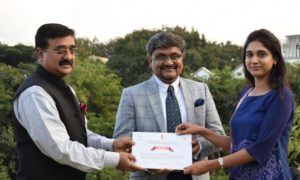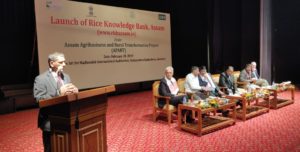 Assam’s most awaited festival – the Rongali Bihu, also known as ‘Bohaag Bihu’ which marks the beginning of the new Assamese calendar year started. Assam celebrates major agricultural events as the festival of Bihu. In Assam, three Bihu festivals are celebrated in a year called as Rongali Bihu or Bohag Bihu, Bhugali (Magh Bihu) and Kangali (Kati Bihu) for marking the distinctive phase in the farming calendar. Assam’s most awaited festival – the Rongali Bihu, also known as ‘Bohaag Bihu’ which marks the beginning of the new Assamese calendar year started. Assam celebrates major agricultural events as the festival of Bihu. In Assam, three Bihu festivals are celebrated in a year called as Rongali Bihu or Bohag Bihu, Bhugali (Magh Bihu) and Kangali (Kati Bihu) for marking the distinctive phase in the farming calendar. |
| Source: NDTV |
 ‘Kandhamal Haldi’, a variety of turmeric indigenous to southern Odisha, has earned the Geographical indication (GI) tag from Intellectual Property India, an organization functioning under the auspices of the Union ministry of commerce & industry. The recognition coincided with the state’s Foundation Day (Utkal Divas). Kandhamal in Odisha’s southern hinterland is famed for its turmeric. The agricultural product also stands out for its healing properties and arresting aroma. ‘Kandhamal Haldi’, a variety of turmeric indigenous to southern Odisha, has earned the Geographical indication (GI) tag from Intellectual Property India, an organization functioning under the auspices of the Union ministry of commerce & industry. The recognition coincided with the state’s Foundation Day (Utkal Divas). Kandhamal in Odisha’s southern hinterland is famed for its turmeric. The agricultural product also stands out for its healing properties and arresting aroma. |
| Source: Business Standard |
 For the second year in succession, Telangana ranks number 1 in the e-Learning training program of theDepartment of Personnel and Training (DoPT), Government India. During the financial year 2018-19, Dr. MCR HRD Institute enrolled over 20,000 field staff in different districts of the State to impart training on 12 soft skills modules and 3 domain-specific modules on RTI, Office Procedures, and Finance & amp; Accounts, apart from Sustainable Development Goals. For the second year in succession, Telangana ranks number 1 in the e-Learning training program of theDepartment of Personnel and Training (DoPT), Government India. During the financial year 2018-19, Dr. MCR HRD Institute enrolled over 20,000 field staff in different districts of the State to impart training on 12 soft skills modules and 3 domain-specific modules on RTI, Office Procedures, and Finance & amp; Accounts, apart from Sustainable Development Goals. |
| Source: The Hindu Business Line |
 The government of Madhya Pradesh has announced the increase of the reservation quotas for the OBCs and has stated that it would also implement 10 per cent quota for the Economically Weaker Sections (EWS) under the general category. The government has proposed to increase the reservation for OBCs from the current 14% to 27%. Madhya Pradesh already has 36% reservation for scheduled castes and tribes. The increase in the reservation for OBCs and 10% reservation for EWS will take the reservation in the state to 73%. The government of Madhya Pradesh has announced the increase of the reservation quotas for the OBCs and has stated that it would also implement 10 per cent quota for the Economically Weaker Sections (EWS) under the general category. The government has proposed to increase the reservation for OBCs from the current 14% to 27%. Madhya Pradesh already has 36% reservation for scheduled castes and tribes. The increase in the reservation for OBCs and 10% reservation for EWS will take the reservation in the state to 73%. |
|
 The government of Uttarakhand has launched the Mukhyamantri Anchal Amrit Yojana to provide milk at the Anganwadi Centres.
About the Scheme The government of Uttarakhand has launched the Mukhyamantri Anchal Amrit Yojana to provide milk at the Anganwadi Centres.
About the Scheme
|
| Nutritional Value of Milk Milk as a source of Protein, Calcium, Vitamins provides benefits like building and maintaining bone and teeth, improving the performance of the nerve system, helping in growth, improving the digestion process, boosting the immunity, treating the dehydration and providing the body with energy. |
| With the inauguration of Nagpur Metro, Nagpur has become the second city of the state of Maharashtra after Mumbai to get a Metro Rail. |
Nagpur Metro
|
 The Chief Minister of West Bengal Mamata Banerjee has unveiled a new scheme Yuvashree Plan II or Yuvashree Arpan to encourage entrepreneurship among youth. Under the Yuvashree Arpan Scheme around fifty thousand Youths who have passed out of ITI or other polytechnic institutes will be eligible to get financial support of Rs One Lakh from the state MSME department to set up their own business initiatives. The Chief Minister of West Bengal Mamata Banerjee has unveiled a new scheme Yuvashree Plan II or Yuvashree Arpan to encourage entrepreneurship among youth. Under the Yuvashree Arpan Scheme around fifty thousand Youths who have passed out of ITI or other polytechnic institutes will be eligible to get financial support of Rs One Lakh from the state MSME department to set up their own business initiatives. |
| About Yuvashree I Yuvashree I was launched by the labour department of the state of West Bengal. Under the scheme, an unemployment allowance of Rs 1500 per month was provided per month to 1,00,000 unemployed youth. |
 The Government of India, the State Government of Chhattisgarh and the World Bank signed a $25.2 Million Loan Agreement to support the State’s Reforms in Expenditure Management under Chhattisgarh Public Financial Management and Accountability Program. The Government of India, the State Government of Chhattisgarh and the World Bank signed a $25.2 Million Loan Agreement to support the State’s Reforms in Expenditure Management under Chhattisgarh Public Financial Management and Accountability Program. |
Chhattisgarh Public Financial Management and Accountability Program
|
 The government of Karnataka has launched the water conservation scheme Jalamrutha. The scheme focuses on drought-proofing measures, including protection and rejuvenation of water bodies. The government of Karnataka has launched the water conservation scheme Jalamrutha. The scheme focuses on drought-proofing measures, including protection and rejuvenation of water bodies. |
About the Scheme
|
 Rice Knowledge Bank-Assam, is an agriculture web portal. It is dedicated to magnifying knowledge on rice production technologies and techniques, best production practices and state agriculture facts. It was launched under the World Bank funded project – Agri-business and Rural Transformation (APART). This portal is the repercussion of efforts of Assam Rural Infrastructure and Agricultural Services Society (ARIAS), Assam Agricultural University (AAU) with technical assistance from the International Rice Research Institute (IRRI). Rice Knowledge Bank-Assam, is an agriculture web portal. It is dedicated to magnifying knowledge on rice production technologies and techniques, best production practices and state agriculture facts. It was launched under the World Bank funded project – Agri-business and Rural Transformation (APART). This portal is the repercussion of efforts of Assam Rural Infrastructure and Agricultural Services Society (ARIAS), Assam Agricultural University (AAU) with technical assistance from the International Rice Research Institute (IRRI). |
You need to login to perform this action.
You will be redirected in
3 sec
